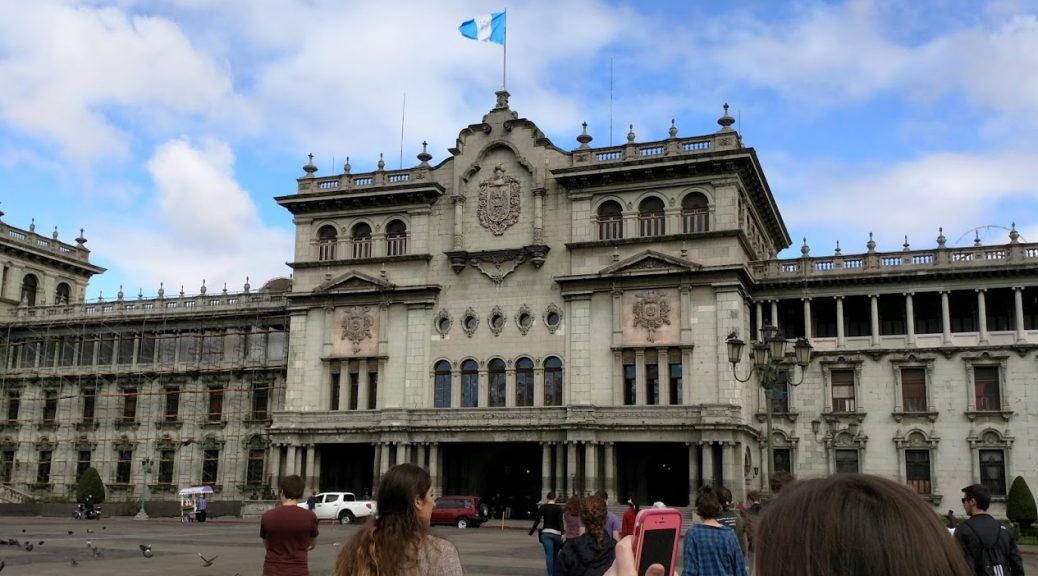21 January 2024
La Terminal
On Wednesday, January 19 our

Guatemala-Cuba Intercultural group had the opportunity to visit a place called “La Terminal,” a market in Guatemala City. There
sim
ply are not words to describe the poverty we saw there. I have seen and interacted with poverty in the US in both rural and urban settings, and it simply does not come close to what we saw in La Terminal. Everything everywhere reeked of garbage and gasoline. Fruits, vegetables,

and worse rotted in the streets. There were families of eight to twelve living in spaces that seemed smaller than a dorm room. These people, these human beings with hopes and dreams and dignity must pay 10 Quetzal (roughly $1.30) to shower and 2Q to use the toilet. 10Q is nearly 10% of the minimum wage here in Guatemala and roughly 50% of the average daily wages of those who are self-employed or living in rural areas.
Cayalá
The next day, Thursday, January 20, we went to a place called Cayalá. Cayalá is owned by one family and sits on roughly 350 acres of previously forested land. The streets  are cobblestone, the buildings white with clean terracotta roofs, and there is no trash in sight. The bathrooms are fancy – and free. If you dropped me in La Terminal, and then dropped me in Cayalá, never in a million years would I guess that they are just over 3 miles apart. 3 miles! That is all that separates some of the richest in this country from some of the poorest. The paradox of Cayalá, the gross irony, is that “cayalá” means “paradise” in an indigenous Mayan language spoken by people who certainly do not live there. The wealth, the amount of space taken up, and the inherent arrogance it takes for those living there to
are cobblestone, the buildings white with clean terracotta roofs, and there is no trash in sight. The bathrooms are fancy – and free. If you dropped me in La Terminal, and then dropped me in Cayalá, never in a million years would I guess that they are just over 3 miles apart. 3 miles! That is all that separates some of the richest in this country from some of the poorest. The paradox of Cayalá, the gross irony, is that “cayalá” means “paradise” in an indigenous Mayan language spoken by people who certainly do not live there. The wealth, the amount of space taken up, and the inherent arrogance it takes for those living there to  simply ignore the poverty sitting at their feet was nauseating.
simply ignore the poverty sitting at their feet was nauseating.
Perhaps even more nauseating is how close to home this situation is. We all know the parts of town we want to avoid, the ones we aspire to live in. We all sit at the intersection with the window up, pretending not to see the person begging. We all, all too often, choose ignorance and judgment over acceptance and curiosity. If we want to live into the life that Christ calls us to, that Mennonite values prescribe, and that our humanity demands, we must do something to combat the gross inequalities in the world. And so my question going out of these experiences was this: how do we reconcile the way we live with the way those in La Terminal live, and how do we change how we live going out of that experience?
First, I must say that to not change anything about the way you live after such an experience is to kill your humanity. Second, there are so many things we can change about the way we live after an experience like that, but it will look  different for everyone. We must change the way we live in a way that is humbling and beneficial to those from whose poverty many of us benefit. Here are some ideas our group came up with:
different for everyone. We must change the way we live in a way that is humbling and beneficial to those from whose poverty many of us benefit. Here are some ideas our group came up with:
- Waste no food. Clear the plate or save the leftovers.
- Hang-dry clothes.
- Live below your means and donate as much as you can. Consumerism perpetuates inequality.
- Think twice before judging people, especially based on socioeconomic status. Curiosity is a much better choice.
- Tell others about the experience. To learn someone’s story and tell no one is to silence them.
This is a short, infant list, but it’s a start. And a start is far better than the sacrifice of our humanity.
-Joshua Stucky

